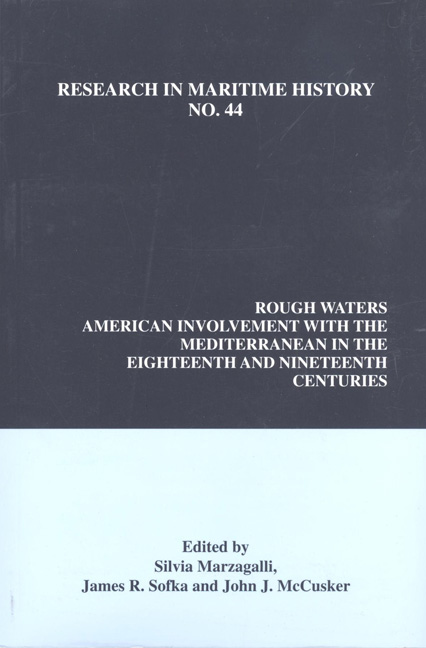Book contents
- Frontmatter
- Contents
- About the Editors
- Contributors' Notes
- “Rough Waters: American Involvement in the Mediterranean in the Eighteenth and Nineteenth Centuries: An Introduction”
- “Worth a War? The Importance of the Trade between British America and the Mediterranean”
- “Relations between North America and the Italian Peninsula, 1763-1799: Tuscany, Genoa and Naples”
- “American Shipping into the Mediterranean during the French Wars: A First Approach”
- “Notes toward a Franco-American Mediterranean 'From Below'”
- “Consuls and Consiglieri: United States Relations with the Italian States, 1790-1815”
- “Old and New Republics: Diplomatic Relations between the Republic of Genoa and the United States of America”
- ‘“From the Halls of Montesuma, to the Shores of Tripoli:’ Antoine Zuchet and the First Barbary War, 1801-1805”
- “Minorca: The First United States Naval Base in the Mediterranean and the American Consulate at Port Mahon”
- “‘The Jeffersonian Idea of National Security’ Revisited”
- “The Reluctant Warrior: Thomas Jefferson and the Tripolitan War, 1801-1805”
- “Slavery as Social Mobility? Western Slaves in Late Eighteenth Century Algiers”
- “Americans in the Mediterranean in the Late Eighteenth and Early Nineteenth Centuries: Concluding Remarks”
“Consuls and Consiglieri: United States Relations with the Italian States, 1790-1815”
- Frontmatter
- Contents
- About the Editors
- Contributors' Notes
- “Rough Waters: American Involvement in the Mediterranean in the Eighteenth and Nineteenth Centuries: An Introduction”
- “Worth a War? The Importance of the Trade between British America and the Mediterranean”
- “Relations between North America and the Italian Peninsula, 1763-1799: Tuscany, Genoa and Naples”
- “American Shipping into the Mediterranean during the French Wars: A First Approach”
- “Notes toward a Franco-American Mediterranean 'From Below'”
- “Consuls and Consiglieri: United States Relations with the Italian States, 1790-1815”
- “Old and New Republics: Diplomatic Relations between the Republic of Genoa and the United States of America”
- ‘“From the Halls of Montesuma, to the Shores of Tripoli:’ Antoine Zuchet and the First Barbary War, 1801-1805”
- “Minorca: The First United States Naval Base in the Mediterranean and the American Consulate at Port Mahon”
- “‘The Jeffersonian Idea of National Security’ Revisited”
- “The Reluctant Warrior: Thomas Jefferson and the Tripolitan War, 1801-1805”
- “Slavery as Social Mobility? Western Slaves in Late Eighteenth Century Algiers”
- “Americans in the Mediterranean in the Late Eighteenth and Early Nineteenth Centuries: Concluding Remarks”
Summary
In 1804 the merchant John Belknap placed an advertisement in the Boston Gazette for “Italian Goods… from Leghorn and for sale at 38 Long Wharf, Boston.” Among the items Belknap listed were “2 trunks sewing silk, silk handkerchiefs, 4 cases black crapes, 25 bags feathers, 55 boxes Olives, Capers and Anchovies, 12 casks Olive Oil.” Within a year he offered “a variety of Italian goods from Leghorn and Naples for sale on liberal terms,” including “3 trunks sewing silks, assorted colors, 1 case men's silk hats and ladies bonnets, 3 casks Olive Oil, 3 pipes Marsala Wine, 50 casks Marseilles Claret, and 50,000 Spanish quills.” Like hundreds of other merchants operating out of ports up and down the east coast of the United States in the beginning of the nineteenth century, Belknap was engaged in a highly lucrative trade with Italy. During the years of “neutral trade” – a period extending from the outbreak of the French Revolutionary and Napoleonic wars in 1793 through Napoleon's final defeat in 1814-1815 – the virtual disappearance from international commerce of ships from Holland, France, Spain and elsewhere created a voyage in the international trading system that American merchants rushed to fill.
To enable their large and lucrative trade to operate, American merchants required good relations with local authorities abroad while remaining vigilant and informed about threats to the safety of their ships and crews. In port, weather conditions and market fluctuations could frustrate the ambitions of even the well-run operations. To support its growing networks of commercial activity around the globe, the United States established a Consular Service in 1792. The Consular Act required foreign- and native-born men employed by the Consular Service to provide American merchants with commercial and military intelligence as well as to broker commercial and diplomatic relations with foreign officials. The Act also called for consuls to report to Washington every six months concerning American vessels entering and clearing their respective ports. The consular records thus provide a valuable source for examining the contexts and significance of American interaction with foreign peoples, places, goods and ideas during the early decades of the involvement of the United States in international affairs.
- Type
- Chapter
- Information
- Rough WatersAmerican Involvement with the Mediterranean in the Eighteenth and Nineteenth Centuries, pp. 77 - 100Publisher: Liverpool University PressPrint publication year: 2010

